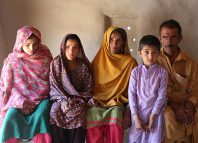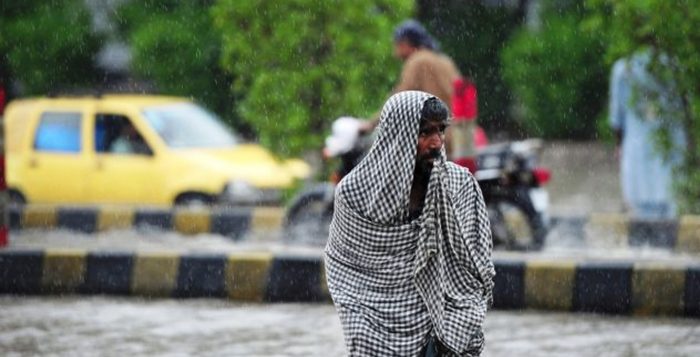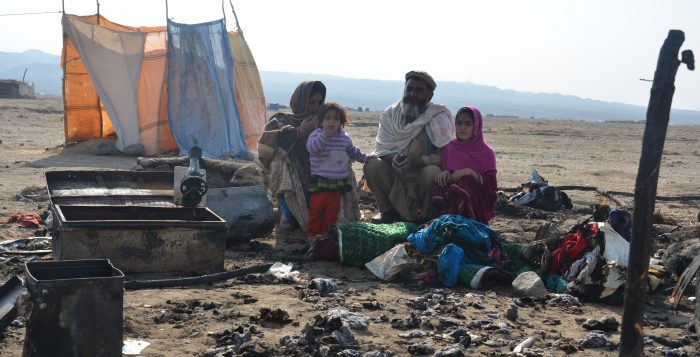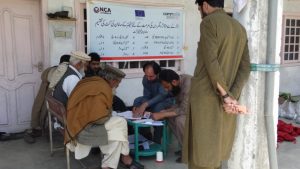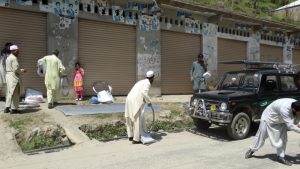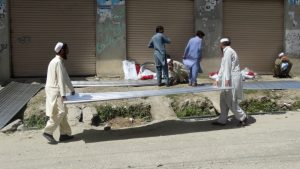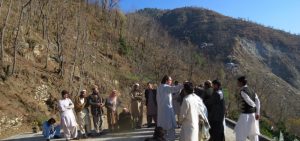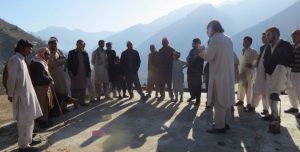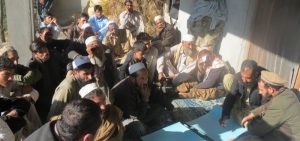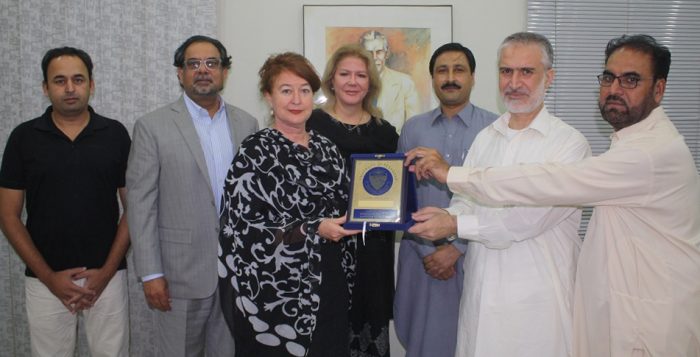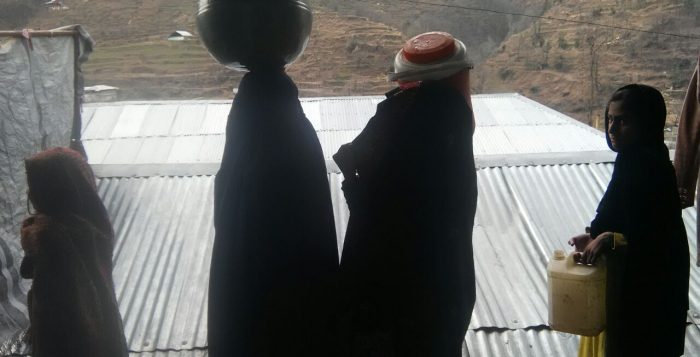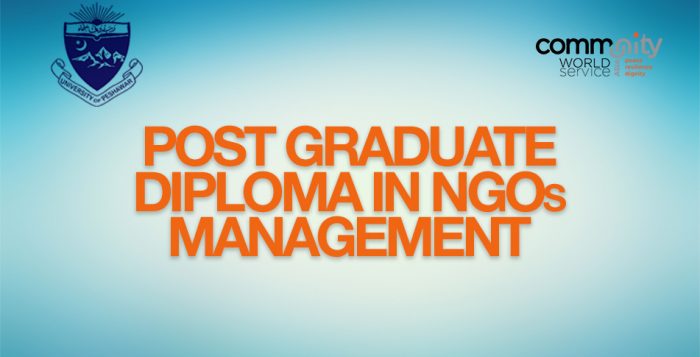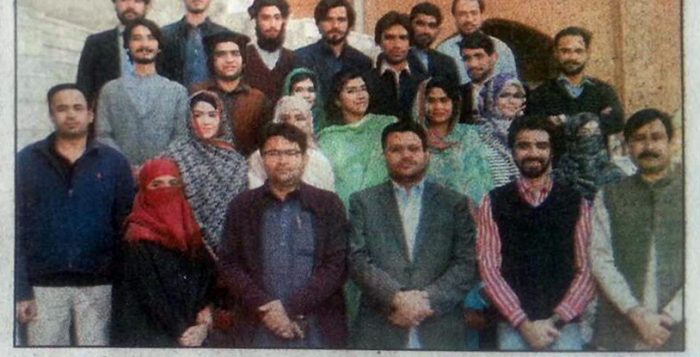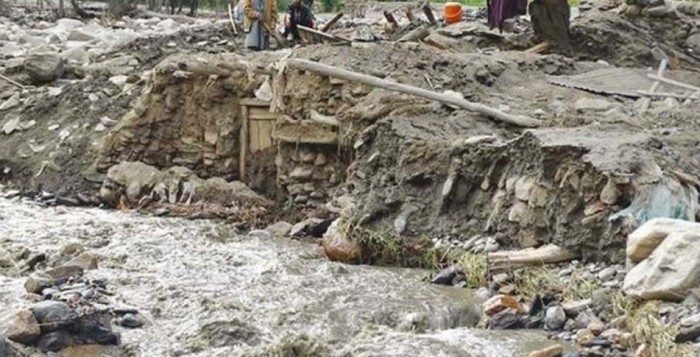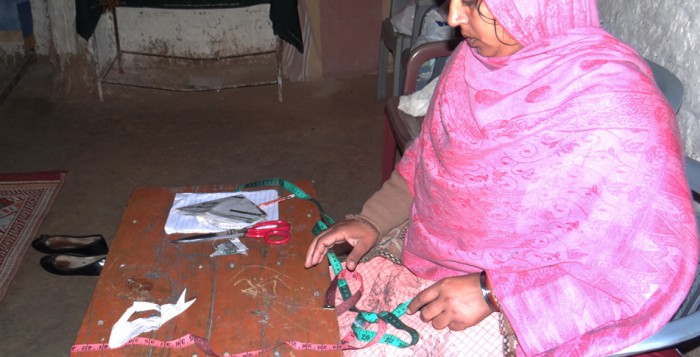| Duration | May 15, 2016 — Apr 30, 2018 | |
| Location | Union Council Bar Puran, Bengalai, Damori, Kuzkana and Shahpur in Shangla District | |
| Key Activities |
| |
| Participants | 61,461 community members |
Archives
Monsoon rains have made its onset, claimed twenty-one human lives
photo credit: https://www.samaa.tv
Monsoon rains have made its onset in Pakistan started Monday, June 26, 2017 and since then different parts of the country have received precipitation with intervals. Karachi and Hub are the most affected areas where flooding and electrocution has claimed seventeen human lives. Five persons were electrocuted in different parts of Karachi city and two children drowned in a pond, while nine people including two children died due to heavy rains in Hub and Lasbela areas of Baluchistan. Flash floods have also swept away several houses in Hub, Baluchistan.
In Khyber Pakhtunkhawa and Gilgit Baltistan intermittent rain was witnessed in various regions, out of which Chitral, Lower Dir, Bajaur, Shangla and Upper Dir saw minimal rain while Attar Pak saw received the heaviest spell. One boy lost his life in Chitral in rain related incidents.
Rain-thundershowers with gusty winds may occur at scattered places of Hyderabad, Karachi, Mirpurkhas, Tharparkar, Shaheed Benazirabad division, and at isolated places of Islamabad, Rawalpindi, Gujranwala, Lahore, Malakand, Hazara, Kohat, Bannu, D I Khan, Kashmir and Gilgit-Baltistan.
There is risk of landslides in hilly areas of upper Khyber-Pakhtukhwa, Malakand, Hazara, Gilgit-Baltistan and Kashmir.
Community World Service Asia Response: Community World Service Asia will monitor the situation and will try to get updated information from different stakeholders. Its emergency response teams are ready and will be deputed immediately if the need to respond to the crisis arise.
Contacts:
Dennis Joseph
Associate Director – Disaster Management Program
Email: dennis.joseph@communityworldservice.asia
Cell: +92 300 855 7414
Palwashay Arbab
Head of Communications
Email: palwashay.arbab@communityworldservice.asia
Tel: +92 42 3586 5338
Sources:
www.samaa.tv
www.tribune.com.pk
www.dawn.com
A Refugee Story
A Cold Winter – Making winter warm for Nowroze and his family
“I’ve met so many who have lost so much. But they never lose their dreams for their children or their desire to better our world. They ask for little in return – only our support in their time of greatest need” — UN Secretary-General, António Guterres
June 20th is World Refugee Day. This day is marked to support millions of families all over the world who have lost their homes and dear ones because of violence, natural disasters or war. World refugee day provides an opportunity to the global community to help refugees worldwide in rebuilding their lives and achieving some sort of normalcy in their everyday living. This day is celebrated to increase awareness on the challenges, resilience and real life stories of refugees to among people.
Pakistan has been home to large influx of refugees since its very existence in 1947. First their were migrants from the newly divided subcontinent. Then in 1990s a new wave of settlers came into Pakistan from Afghanistan. They have since then lived life as refugees in Pakistan. Recently, as part of national policy, the Afghan refugees were asked to repatriate back to their homeland.
Afghan refugees in Pakistan have been supported with many forms of lifesaving assistance, safety and protection by the government agencies and aid organizations for many decades. They have been provided tents, shelter, kitchen took kits, home-kits, beddings and also provided with livelihood opportunities. The goal of celebrating this event is increasing public awareness among common public by sharing the related refugee stories.
Nowroze Khan, son of Toor Khan, is an Afghan refugee who lived in Peshawar, Pakistan for twenty years. He started his family there and worked on daily wages (from PKR 400- 500 per day) on and off to support his family of seven. Difficult to meet all the needs of his family with the limited income, life however remained peaceful and comfortable for them. In September last year, Nowroze and his family were repatriated to Afghanistan – a homeland still in conflict and left in rubbles. Upon their return, the family lived in an old tent in Gamberie Refugee Camp, Qarghaie District in Laghman Province.
On an unfortunate December night (December 12th) last year, Nowroze Khan lost the little that him and his owned in a fierce fire that engulfed their shelter. With all his belongings gone and the only PKR 27,000 that he had saved over the year, Nowroze was left homeless and destitute in his very own country once again.
narrated Nowroze sadly.“I cried out to the villagers to save my burning house but it was too late,”
Resources and infrastructure at the Gamberie Camp, which is no less than a dessert, are limited for returnees like Nowroze Khan. No proper mechanism was present to combat such unexpected incidents. Our neighbors in the village, whom we had been acquainted with in the few months since our return, were generous and provided us with whatever food, clothes and blankets that they could afford. That support could not go on for long either since they themselves were living in poor conditions.“The fire spread very fast and my wife and I only managed to save our children in the given time.”
In addition, Nowroze Khan received a shelter and blankets at the Gamberie camp as part of the assistance by Community World Service Asia. The winter was harsh, and his family needed all the protection they could from the freezing winds and the snow.“After a few weeks and for going around the villages seeking help, I came across a needs assessment team and was selected as a beneficiary under the emergency response for Returnees project supported by Community World Service Asia. I received a tent, two blankets and a two rounds of cash grants. We purchased essential food items including vegetables, oil, flour, tea and pulses with the money we received. We also availed health services at the Gamberie Camp, when my children got ill.”
Nowroze is now living in a shelter with his six children and wife at the Gamberie camp among many other returnees. These are Afghanis living a life of refugees in their own homeland. Many of them are in need of homes, health care, livelihoods and education.
Refugees are true survivors – they must be given the necessary support for them to recover from their loss, rebuild their life to its full capacity and up to international human rights standards.
Shelter and Safety: Distributing shelter kits to earthquake-hit families in Shangla
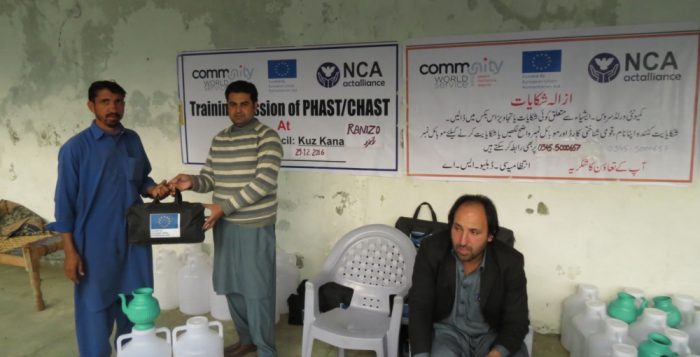
Community World Service Asia is implementing an integrated emergency WASH and Shelter project for families affected by the 2015 earthquake in District Shangla, Pakistan. The target Union Councils of the intervention included Shah Pur, Damorhi, Kuz Kana, Bar Puran and Banglai.
The key components of this short-term disaster response project include Rehabilitation of Water Supply Schemes, Repair and reconstruction of Latrines and Distribution of Self help repair Shelter kits. The project also provides trainings on Participatory Hygiene and Sanitation Transformation (PHAST) and Children Hygiene and Sanitation Training (CHAST) techniques of health and hygiene along with provision of hygiene kits and waste bins to the communities.
The distribution of self-help repair shelter kits to the affected families has been completed. A total of 1400 shelter repair kits have been distributed among the targeted earthquake affected households. The shelter kits distribution was done in three of the selected union councils including Damori, Kuzkana and Shahpur.
A standard process for the distribution based on the selection criteria of participants was followed under the project. Tokens were distributed amongst the concerned communities and information regarding the distribution ceremony was shared with all participants. It was mandatory for the community member to bring their original identity card along with the token to receive the assigned kit.
On the day of distribution, an orientation sessions on safer construction techniques was conducted to enable the communities to utilize the shelter repair kit as per the guidelines. Follow-up visits are scheduled to be conducted in the coming months to guide the communities on how and where to construct their shelter and how to utilize the kit to avail its maximum benefits. Along with follow-up visits, follow-up sessions on safer construction techniques are also planned in the year ahead.
Department of Social work, University of Peshawar organized a consultation with the Executive Director, The Sphere Project
Department of Social work, University of Peshawar organized a consultation with the Executive Director, The Sphere Project about use of Sphere Handbook globally and how academia around the globe is promoting Sphere Standards for ensuring quality response during humanitarian response.
Honorable Pro Vice Chancellor, University of Peshawar, Prof. Dr. Muhammad Abid welcomed the participants and guests. At the start of the consultation there was a brief shield distribution ceremony. Prof. Dr. Muhammad Abid presented shield to Mr. Furruk Marvin, Regional Representative of Community World Service Asia for the valuable partnership with University of Peshawar. He also presented a shield to the visiting guest, Ms. Christine Knudsen.
Community World Service Asia Paid its deepest regard for the outstanding partnership and support provided by university of Peshawar Mr. Furruk Marvin Pervez Presented shield of honor to the worthy Vice Chancellor Prof. Dr. Muhamamad Abid, Prof. Dr. Rashid Khan, Chairman Department of Social work and the focal person for the partnership Dr. Muhammad Ibrar for their valuable support in making this partnership a success.
Ms. Christine Knudsen shared the overviews of the sphere project and shares the purpose and progress on sphere handbook revision. She also shared how Sphere handbook is used by academia around the globe and the role academia is playing in promoting Sphere standards. Among the consultation participants were the Academician from Department of Social work University of Punjab, Department of Social Work , University of Peshawar, PRCS, Health Department, Government of Khyber Pukhtun Khwa, FDMA.
SourceEnsuring the right to water
Remote and rural areas affected by recurrent natural disasters often suffer the most when it comes to their recovery, rehabilitation and development. The 7.5 magnitude earthquake epicentered in the Hindu Kush range in winter of 2015 severely shook Pakistan’s mountainous northern belt, killing nearly three hundred people. In its aftermath, more than 14,000 houses were severely damaged or completely destroyed; community infrastructure was unusable and livelihoods were diminished. Almost a year later, the poor socio-economic life of the inhabitants remained largely unchanged.
High altitude villages perched on the steep mountain slopes of district Shangla in northern Pakistan were severely damaged by the earthquake. One of the hardest hit areas was Village Tanshit; mainly comprised of steep, rocky terrain dotted with 221 traditional, rural homestead compounds. Multiple families reside in each compound. After the earthquake, the community’s most basic infrastructure and facilities, which had been built with great effort and years of savings, were lost. The village’s sole water supply scheme became one of the earthquake’s most significant casualties.
For the next nine months after the earthquake, the local women had to make a forty five minute climb on foot to a mountain stream and return with as much water as they could carry everyday. Families living in mountain village compounds have strong traditional, social and cultural codes for the protection of women, even for those undertaking daily domestic responsibilities. This usually means that the women stay very close to their homes. However, to access water, the women of Tanshit had to travel a long distance carrying water on their heads through wild and rocky mountain treks. As the water carried by a single person was insufficient for the entire family’s needs, sometimes the children were tasked with carrying water from the streams on their way back from school. This was dangerous and had to be done in daylight. In warmer months, these communities became very vulnerable to waterborne diseases as hygiene could not be maintained while carrying and storing this stream water.
“Safe drinking water and adequate sanitation are crucial for poverty reduction, crucial for sustainable development and crucial for achieving any and every one of the Millennium Development Goals,” Ban Ki-moon, UN Secretary General
The human right to water and to sanitation constitutes the right of every individual, without discrimination, to sufficient, safe, acceptable, accessible and affordable water and sanitation for personal use. To ensure this right, in 2016 Community World Service Asia, in partnership with Norwegian Church Aid and ECHO, assessed the village Tanshit’s water system and was selected as one of the twenty communities under its’ integrated WASH, Shelter and Cash-for-Work programme. Technical assistance, construction materials and paid labor opportunities were provided to help villagers to restore their water system, reconstruct latrines and bathing facilities, and repair their homes. A village WASH Committees was formed to articulate the basic communal needs according to the project’s objectives and scope.
The project team arranged hygiene sessions with the village women’s group and sensitized them on hygienic practices through Child Hygiene and Sanitation Training (CHAST) and Participatory Hygiene and Sanitation Transformation (PHAST) approaches. A pre-KAP (Knowledge, Attitudes, Practices) survey was also conducted to gauge the pre-existing or baseline hygienic practices of the families and to help demonstrate subsequent gains.
To ensure ownership, each village’s drinking water supply scheme was selected on the recommendation of village committees. After a technical feasibility assessment conducted by members of Community World Service Asia’s engineering team, Tanshit’s water supply scheme was rehabilitated, with additional resources, successfully. The water source was reconstructed, protected and pipelines were installed throughout the village. The community contributed additional labor and materials as well to this reconstruction.
Today, Tanshit’s drinking water supply scheme supplies clean, safe and ample water to 221 households as per Sphere standards. The risk of waterborne diseases has been decreased. The social protection of women has been ensured and their cultural sensitivities are preserved. Around 1,200 individuals are undertaking more hygienic practices that will significantly contribute to maintaining healthier families. The project team also mobilized the local community towards the maintenance and upkeep of their water system through a local community savings plan. They have also begun a small, intra-village savings and lending activity to commonly support their lowest income groups. This will enable every community member to maintain their compound’s connections to the scheme.
Become a certified NGO Management Expert now
Through Community World Service Asia’s collaboration with academia, the University of Peshawar has just launched a post-grad diploma course on NGOs Management. Download your copy of the brochure to get complete details on the course and how to apply.
Training on Ethical and Moral Responsibilities for NGOs for the students of the Social Work Program, University of Peshawar
“Community World Service Asia under its Capacity Institutional Program (CIP) organized a two day training on Ethical and Moral Responsibilities for NGOs for the students of the Social Work Program, at University of Peshawar, on December 1-2, 2016. In this training, a total of 21 students participated including 12 boys and 9 girls. These students were provided with practical knowledge about the Quality and Accountability principles and mechanism for NGOs’ program and staff. The focus was to orient the students on the accountability mechanism followed by local, sub-national and national NGOs in Pakistan.
The training aimed to promote conceptual clarity and practical approaches of NGOs structure and procedures and policies for safety of their staff and program participants including women, children and society’s vulnerable groups.”
Aaj, Peshawar, a local Newspaper also published news about the successful training at the University of Peshawar this Saturday (December 3rd).
Situation Alert: 43 Lives lost as monsoon rains hit northern KPK!
At least 43 people, including eight security officials, have reportedly died after the westerly wave of monsoon rains entered the Khyber Pakhtunkhwa (KPK) province of Pakistan late on Saturday night. The district of Chitral in this northern part of KPK has so far been the worst hit by the flash floods that followed soon after the rains.
As many as 17 people are reported missing in Ursoon Village of Chitral while many more have been injured as clouds of water burst into the area.
The continuing heavy rainfall destroyed around 30 houses in villages near the Pak-Afghan border.
Monsoon rains in Pakistan began late Saturday and continued to shower for hours, with hard-hitting rain covering the KPK province the most. KPK has been most affected by monsoon flooding in Pakistan in the recent years.
Pervez Khattak, Chief Minister of KPK Province, declared red alert in the flood hit areas of Chitral and has announced monetary compensation for the flood affected families.
Community World Service Asia is currently monitoring the situation. The organization’s emergency response team is ready and will start emergency relief activities if required.
Contacts:
Muhammad Fazal
Associate Director
Emergencies/DRR/Climate Change
Email: fazil.sardar@communitryworldservice.asia
Cell: +92 332 5586134
Palwashay Arbab
Head of Communications
Email: palwashay.arbab@communityworldservice.asia
Cell: +92 42 3586 5338
Sources:
www.tribune.com.pk
www.samaa.tv
Defying Circumstances
Mehnaz, 35, was born in Dhenda, a village in district Haripur. In the 1980s, her parents moved to Pakistan after the Afghan jihad following which her father was unable to earn a decent livelihood. The few small jobs that he did only helped bring a very small income home. As a result, Mehnaz and her family suffered from poverty and hardship. As per family tradition, Mehnaz was married to a man from her clan but despite making compromises, her marriage fell apart. Back at her parents’ home with her now year-old son, Mehnaz felt that she had added to the existing financial worries of her family. Without a place to turn to for help, she found herself falling into depression. It was during this low that she found out about the Community World Service Asia’s training in the Dhenda area. In just her second month in the dress designing trade, she was getting orders from people; she now earns about PKR 300/ per day.
Mehnaz’s determination to raise her son independently as well as contribute to household expenses led her to successfully establish a tailoring center for women in Dhenda. Currently, she is an instructor at the center with 20 women under her training. Her story is one of resilience to overwhelming circumstances and her passion to work despite tremendous challenges truly inspirational.




